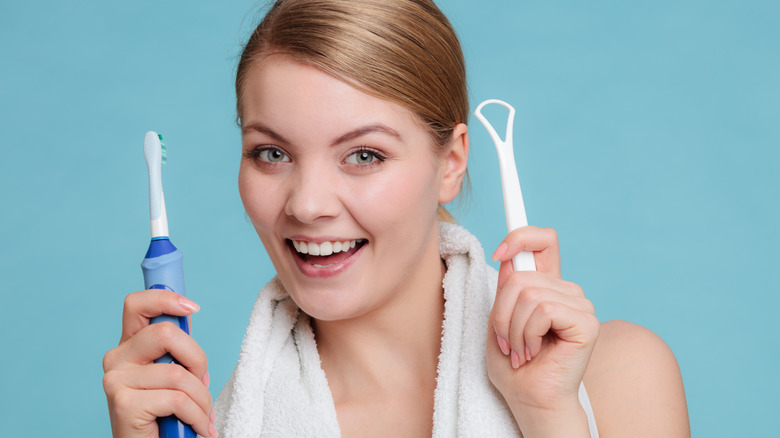Hairy tongue, otherwise referred to as “coated tongue,” is a health condition characterized by an over-accumulation of keratin on the surface of the tongue, according to experts at Brigham and Women’s Hospital. This build-up can cause the filiform papillae that populate the surface of our tongue to elongate, resembling strands of hair. While most often affecting adults in their 30s or older (via American Journal of Case Reports), hairy tongue is said to affect up to 13% of all people, reports The American Academy of Oral Medicine.
Cases of hairy tongue can be white, black, brown, yellow, or green in appearance (via Brigham and Women’s Hospital). However, the condition is neither contagious, harmful, or infection-related. In fact, it usually isn’t accompanied by any symptoms at all. In some cases, however, patients with a case of hairy tongue may experience an undesirable taste in the mouth, dryness, or very seldom, gagging. So what exactly prompts the development of hairy tongue?
The importance of practicing proper oral hygiene

The American Academy of Oral Medicine states that ongoing use of antibiotics, certain medications, radiation treatment of the neck or head, extreme coffee or tea consumption, smoking, or eating a soft food diet that doesn’t allow for adequate scraping of the tongue can all increase one’s risk for hairy tongue. Most often, however, poor oral hygiene is the predominant cause of the condition. Dehydration can also be a contributing factor, notes Brigham and Women’s Hospital.
So how can we help keep a case of hairy tongue at bay? The American Academy of Oral Medicine suggests incorporating tongue brushing into your regular teeth-brushing routine. One may also alternatively use a tongue scraper to keep the surface of the tongue clean. Brigham and Women’s Hospital also suggests regularly drinking water, limiting caffeine consumption, avoiding dehydrating mouthwashes, and eating a well-rounded diet. After one case of hairy tongue, the chance of it coming back increases, notes The American Academy of Oral Medicine. Therefore, speak with a doctor in the event of severe cases, as they may suggest prescription anti-fungal medications or surgery for shortening the filiform papillae (per Healthline).




